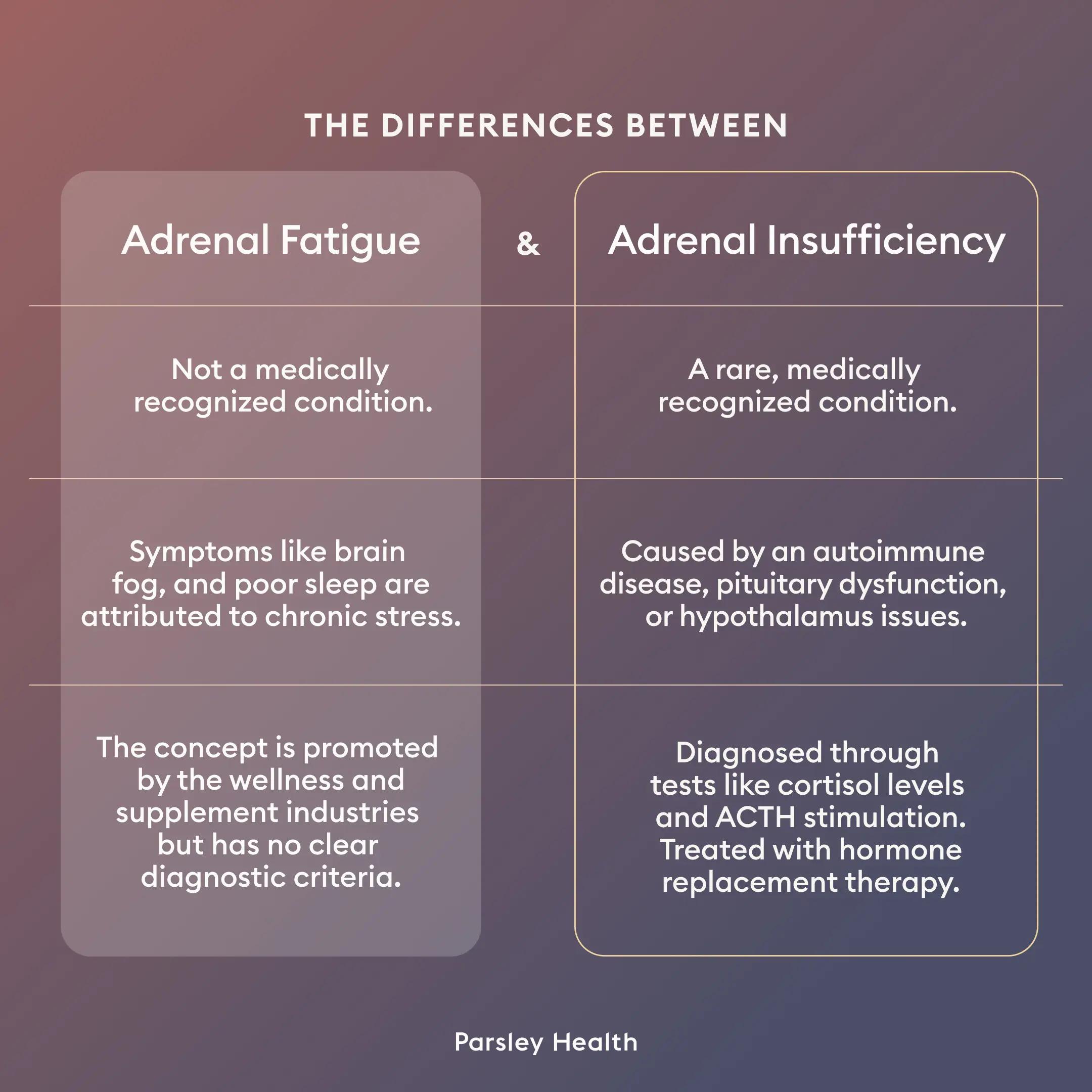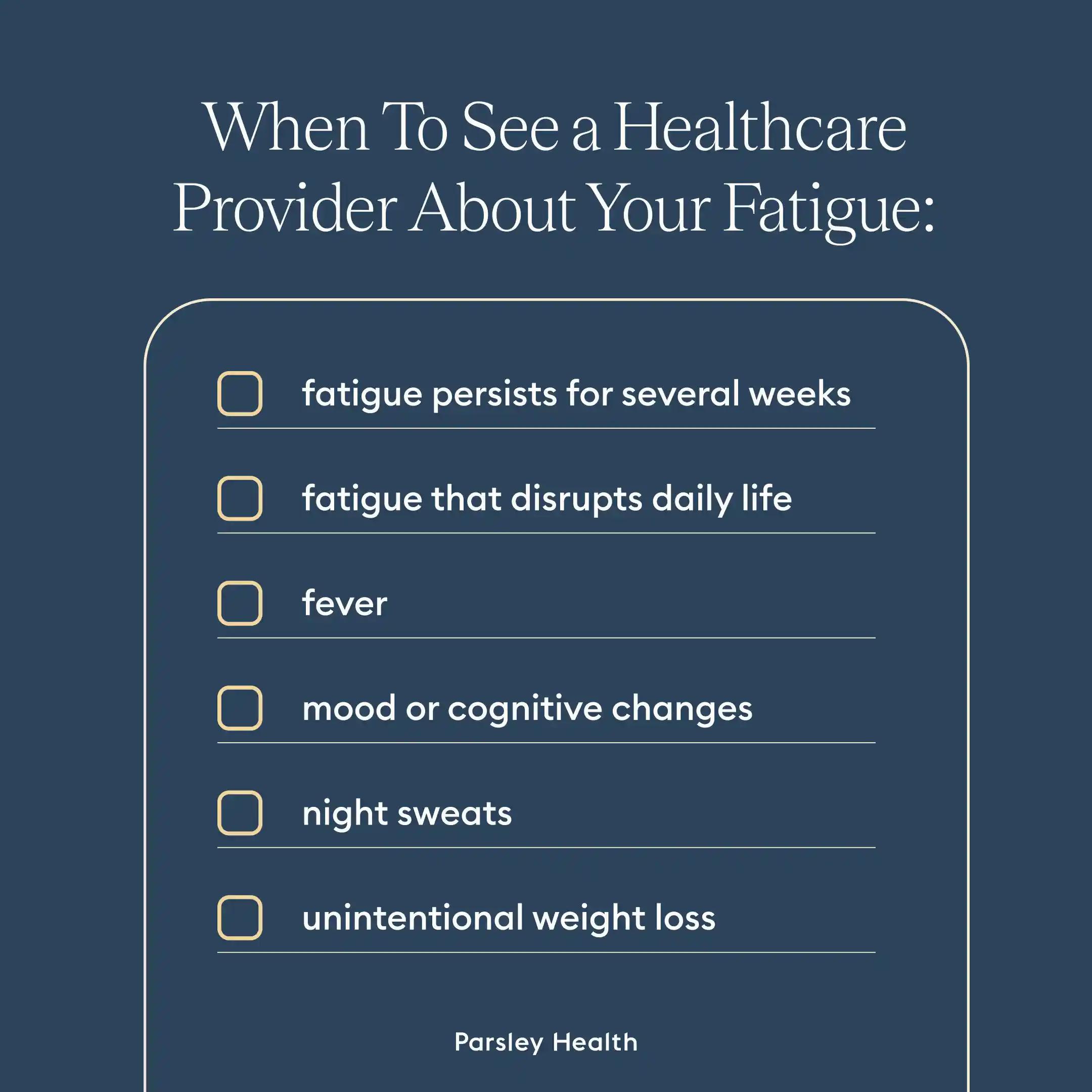“Adrenal fatigue” is not a medically recognized term, but adrenal insufficiency, although rare, is a serious medical condition requiring treatment. Fatigue is a nonspecific symptom that can have many root causes, from lifestyle factors, hormonal changes, underlying conditions and more. Talking to an experienced clinician can help you get to the root cause of your plummeting energy level and get you back to feeling better.
Do you feel like you can’t seem to recharge your batteries even when you take time to rest and get adequate sleep? In other words, are you feeling rundown, tired all the time, and like you can’t complete everyday activities or enjoy the things you used to?
You may have come across the term “adrenal fatigue” to describe this experience of burnout. It’s not a medically recognized term, but something else might be going on, and you deserve answers so that you can find the right treatments or solutions for getting your energy back.
“Despite the lack of scientific validity, ‘adrenal fatigue’ remains a popular term because it resonates with individuals struggling with unexplained chronic fatigue,” says Lizzie Benge, MD, a sleep medicine physician and a faculty member at Harvard Medical School’s Division of Sleep and Circadian Disorders.
“It provides a simple explanation for complex, nonspecific symptoms that can often feel overlooked by conventional medicine,” she adds. “The idea that stress can lead to physiological consequences is broadly true, even if the explanation offered by adrenal fatigue oversimplifies it.”
In this article, we’ll dig into the differences between adrenal fatigue and adrenal insufficiency, causes of severe fatigue, how to combat fatigue to feel more energetic, and more.
The difference between adrenal fatigue and adrenal insufficiency
Your adrenal glands (you have two) sit atop your kidneys. They make up part of your endocrine system and produce different hormones, including cortisol, the stress hormone.

Adrenal fatigue
No scientific evidence exists to support the concept of adrenal fatigue. However, the term floats around to describe nonspecific symptoms.
‘’Adrenal fatigue’ is a term commonly used in alternative medicine to explain symptoms like chronic fatigue or exhaustion, brain fog, and poor sleep,” Dr. Benge says. “It attributes these issues to the ‘overworking’ of the adrenal glands caused by prolonged stress.”
The concept suggests that chronic stress exposure wears out the adrenal glands and they stop producing adequate hormones. However, this is not the case. What does happen is that, due to chronic stress, your cortisol rhythm can become disrupted and therefore less efficient in supporting you during sustained stressful situations.
“Research hasn’t shown a physiological mechanism that links stress to adrenal dysfunction unless we’re talking about adrenal insufficiency,” Dr. Benge says. “Without clear diagnostic criteria or scientific backing, it’s not acknowledged by medical organizations.”
Unfortunately, marketing practices often promote quick fixes to combat fatigue. “The wellness and supplement industries have also perpetuated this concept,” Dr. Benge explains, “marketing products to ‘support’ adrenal health…[This] highlights a real need for better communication and holistic approaches when addressing fatigue and stress-related health concerns.”
Just because adrenal fatigue isn’t a clinically accepted diagnosis doesn’t mean the symptoms you’re having aren’t real. You’re not just imagining that you’re running on empty. “While ‘adrenal fatigue’ isn’t a scientifically supported diagnosis, the symptoms people associate with it—like exhaustion and brain fog—are real and deserve attention,” adds Pamela Tambini, MD, a double board-certified physician in internal medicine and addiction medicine and the medical director at Engage Wellness.
Adrenal insufficiency
Adrenal insufficiency is a real thing, meaning it’s a clinically recognized diagnosis, but it is rare. About 100 to 280 people per 1 million people have it. The prevalence depends on the type.
“Adrenal insufficiency is a well-defined medical condition where the adrenal glands fail to produce sufficient hormones, particularly cortisol,” Dr. Benge says. “This can happen due to autoimmune damage (Addison’s disease) or issues with the pituitary gland. It’s diagnosed through specific tests, like cortisol level measurements and ACTH stimulation tests, and often treated with hormone replacement therapy.”
Types of adrenal insufficiency
- Primary adrenal insufficiency (Addison’s disease). Damage to the adrenal glands impairs their ability to make enough of cortisol and another hormone called aldosterone, which controls electrolyte balance, stabilizes blood pressure, and supports nerves and muscles.
- Secondary adrenal insufficiency. The pituitary gland (located in the brain) doesn’t make enough adrenocorticotropin (ACTH), a hormone that tells the adrenal glands to make cortisol. As a result, the adrenal glands don’t make enough cortisol and eventually shrink and stop working.
- Tertiary adrenal insufficiency. The hypothalamus doesn’t make enough corticotropin-releasing hormone (CRH), which is necessary for signaling the pituitary gland to make ACTH. Ultimately these issues mean the adrenal glands don’t make enough cortisol.
Primary adrenal insufficiency (aka Addison’s disease) often results from an autoimmune condition in which the body attacks its own tissues and organs. Other causes include cancer and cancer treatment medications as well as some medications that block the adrenal glands from producing certain hormones. Secondary adrenal insufficiency can occur because of noncancerous pituitary gland tumors. And tertiary adrenal insufficiency typically occurs when people take corticosteroids—such as prednisone—long term and then stop.
Symptoms of adrenal insufficiency
- Abdominal pain
- Appetite changes (either loss of appetite or increased cravings for salty foods)
- Darkening of the skin (typically only with Addison’s disease)
- Diarrhea
- Fatigue (long-lasting)
- Joint pain
- Low blood pressure
- Low blood sugar (hypoglycemia)
- Low libido
- Muscle weakness
- Menstrual cycle changes (irregularity or an absence of a period)
- Mood changes (irritability or depression)
- Nausea
- Vomiting
- Weight changes (usually weight loss)
Other conditions or issues that can cause fatigue
“Fatigue is a common but nonspecific symptom with many potential underlying causes,” says Dr. Benge.
“Instead of focusing on the adrenal glands,” Dr Tambini adds, “exploring other potential causes and addressing them with evidence-based strategies is more helpful. Working with a healthcare provider ensures you get to the root of the problem and find solutions that genuinely work for you.”
If you have ongoing or frequent fatigue that doesn’t resolve with extra rest and sleep, then you should see a clinician to help you uncover what might be going on. Here are some possibilities.
Autoimmunity
Autoimmune conditons—such as systemic lupus erythematosus, multiple scleriosis (MS), celiac diasease, rehumatoid arthritis, and more—are associated with fatigue.
Chronic fatigue syndrome
Myalgic encephalomyelitis/chronic fatigue syndrome (ME/CFS) is a serious illness affecting an estimated 3.3 million people in the United States. It causes intense fatigue, making completing your daily activities and tasks difficult.
Chronic kidney or liver disease
Exhaustion and chronic kidney disease go hand in hand, with nearly three-fourths of patients reporting fatigue. Likewise chronic liver disease can also lead to feeling severely rundown for various reasons.
Endometriosis, PCOS, and PMDD
Some medical conditions that have complex interactions with reproductive hormones can tank your energy. These include polycystic ovary syndrome (PCOS), endometriosis, and premenstrual dysphoric disorder (PMDD).
Epstein–Barr Virus
Epstein–Barr Virus (EBV), the virus that causes infectious mononucleosis, can become reactivated and cause intense fatigue. Watch for a fever, sore throat, swollen lymph nodes, and a rash.
Heart disease
Extreme fatigue can be an early symptom of heart disease, especially for people assigned females at birth. The sudden onset of extreme fatigue may signal an impending heart attack. If you are experiencing new or intense fatigue, don’t ignore the symptoms.
Hormonal changes
You might experience crashing fatigue before your period or as part of the menopause transition.
During the luteal phase of the menstrual cycle (the two weeks leading up to your period), fatigue is common, often resulting from shifting progesterone, which peaks and then dives. Both high and low levels of progesterone may cause fatigue.
Experiencing some fatigue or energy changes before and during your period is normal. However, if you’re frequently enduring extreme fatigue or other symptoms before your period, talk to a knowledgeable clinician.
Menopause means you’ve had an absence of a period for a full year. After this moment in time, you’re in postmenopause. Leading up to menopause is the transition known as perimenopause, which can last more than a decade. During perimenopause, your hormones can be erratic— before leading to a decline in estrogen, progesterone, and testosterone—and these fluctuating hormones can impact your energy levels.
Hypothyroidism and hyperthyroidism
Fatigue is a common symptom of both hypothyroidism (underactive thyroid) and hyperthyroidism (overactive thyroid).
Medications
“Drugs like antihistamines, beta-blockers, and certain antidepressants may contribute to fatigue,” Dr. Benge says.
Mental health conditions
“Anxiety and depression are significant contributors to fatigue, often disrupting energy levels and sleep patterns,” Dr. Tambini says.
Narcolepsy
Narcolepsy is a chronic neurological disorder that imapacts your body’s ability to regulate your sleep-wake cycle. For this reason, it can lead to excessive daytime sleepiness or fatigue.
Post-COVID syndrome
Post-COVID syndrome (aka “long COVID”) can occur after someone has contracted the COVID-19 virus. Even after recovery from the immediate illness, people may experience ongoing symptoms of fatigue.
Sleep apnea
Sleep apnea is a serious sleep disorder in which your breathing starts and stops while you’re sleeping, leading to next-day fatigue. If left untreated, sleep apnea can lead to serious chronic health issues.
Vitamin and mineral deficiencies
Several micronutrient deficiencies can also lead to an energy plummet. “For specific deficiencies (e.g., iron or vitamin D), supplements may be helpful, but these should only be used under medical guidance,” Dr. Benge says.
Vitamin and mineral deficiencies and fatigue
One of the most fatigue-inducing is iron deficiency, which can lead to iron deficiency anemia. Iron deficiency anemia means your body doesn’t have enough iron, so it has difficulty producing healthy red blood cells and delivering oxygen to your organs.
Heavy periods can cause iron deficiency and iron deficiency anemia. Other causes include extreme endurance activities, underlying conditions, gastrointestinal issues that may cause nutrient malabsorption (including celiac disease), and genetics.
When to see a healthcare provider
“I recommend seeing a healthcare provider if fatigue persists for several weeks despite adequate rest and lifestyle adjustments,” Dr. Benge says. She also notes these other red flags as a reason to talk to a knowledgeable clinician.
- Fatigue that disrupts daily life or quality of life
- Fatigue linked to a known medical condition, such as hypothyroidism or diabetes
- Fever
- Mood or cognitive changes (that are unexplained or significant)
- Night sweats
- Weight loss (unintentional)

Lifestyle changes to boost energy
Several lifestyle factors can contribute to fatigue, but the good news is that you can change these factors to help support your energy levels.
Prioritize sleep
Inadequate or disrupted sleep can lead to next-day fatigue. “Aim for seven to nine hours of quality sleep each night, and establish a consistent bedtime routine,” Dr. Benge says. “Reducing blue light exposure, particularly in the evening, supports healthy sleep patterns.”
Reduce stress
Stress might leave you feeling wired but tired because it causes autonomic nervous system dysfunction and alters hormone levels. “Practices like mindfulness, meditation, or yoga can reduce stress and improve energy,” Dr. Benge says.
Get optimal nutrition
High-carbohydrate or sugary foods will spike your blood glucose (blood sugar). When your blood sugar spikes, your pancreas releases an excess amount of the hormone insulin, which helps shuttle glucose into your cells to use for energy. But an insulin surge can lower your blood sugar quickly and below your usual level, which can then cause an energy crash. This is called reactive hypoglycemia. Frequent episodes of reactive hypoglycemia place you on a blood sugar roller coaster that can tank your energy.
“Focus on whole foods, like lean proteins, complex carbs, healthy fats, and plenty of fruits and vegetables,” Dr. Benge says. “Limit caffeine and sugar to avoid energy crashes.”
Pair carbohydrates with either protein, healthy fats, fiber, or a combination. These nutrients help slow the absorption of carbohydrates into the bloodstream, keeping blood sugar more stable.
Getting adequate protein can also help counteract fatigue. This protein calculator can help you determine how much you need per day based on your height and weight. However, if you’re highly active and trying to build muscle, you may need even more to support your exercise levels.
Stay hydrated
“Dehydration is a common and often overlooked cause of fatigue,” Dr. Benge says. Sip water throughout the day and skip the juices or sugary beverages, which can cause energy crashes.
Socialize
“Spending time with friends or engaging in community activities can improve emotional and mental energy,” Dr. Benge says.
Get adequate physical activity
“Regular physical activity—tailored to your fitness level—can improve energy and combat fatigue,” Dr. Benge says. A lack of physical activity is associated with lower energy levels. Exercise, on the other hand, helps your body to more effectively manage glucose and insulin. Plus, exercise gives you a dose of feel-good chemicals that can liven you up.
Key takeaways
- “Adrenal fatigue” is not a medically recognized term, but the symptoms often attributed to “adrenal fatigue” are real and treatable.
- Adrenal insufficiency, however, is a rare but serious medical condition requiring treatment.
- Fatigue is a nonspecific symptom that can have many causes, from lifestyle factors, to hormonal changes, underlying conditions, and more.
- Talking to an experienced clinician, such as those at Parsley, can help you get to the root cause of your plummeting energy level and get you back to feeling better. Reach out for a free consultation.
FAQ
What is the fastest way to cure adrenal fatigue?
Adrenal fatigue is not a medically recognized term or concept. Adrenal insufficiency, on the other hand, is a serious medical condition and the treatment required will depend on the type of adrenal insufficiency—primary, secondary, or tertiary—and its underlying causes.
What is the difference between adrenal fatigue and adrenal insufficiency?
Adrenal fatigue is not a medically recognized term or concept but rather a shorthand phrase for describing a constellation of different symptoms related to chornic stress and fatigue. Adrenal insufficiency, on the other hand, is a rare but serious medical condition in which the adrenal glands stop producing certain hormones. If you have ongoing fatigue, other conditions may also be the cause, since adrenal insufficiency is uncommon.
Why do I feel so tired all the time?
You may be tired all the time for several reasons, including lifestyle factors, hormonal changes, underlying conditions, and more. If you have unexplained and ongoing fatigue that doesn’t resolve with adequate rest, talk to a knowledgeable clinician.









